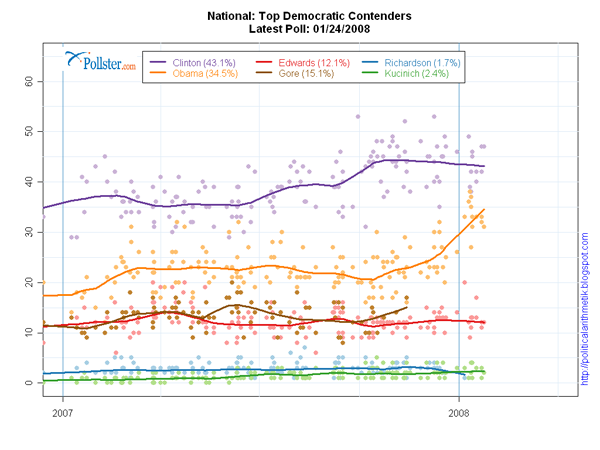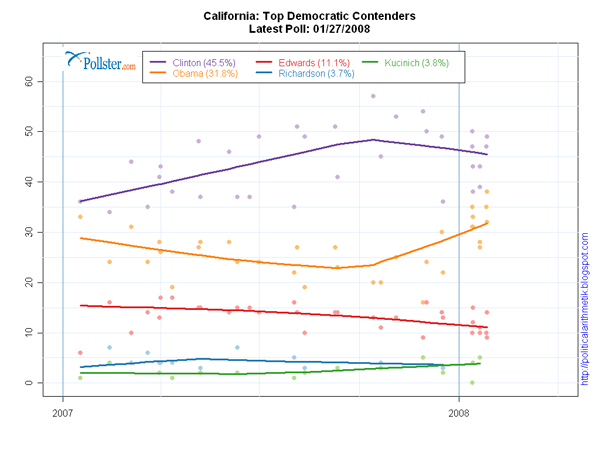Well, the landscape changed more than I thought it would.
McCain takes Florida. Not too much of a surprise. He was polling slightly ahead of Romney — ever so slightly — on the last day. It’s a bit of a shame that he gets declared the "winner" when it was so close. Then again, he does take all of Florida’s GOP electorates.
Rudy, naturally, is dropping out now (yes, yesterday was "Goodbye Rudy Tuesday"), although at least he didn’t entirely embarrass himself by getting beat out by Ron Paul (again). Heck, he even beat the Huck.
The good thing about the demise of Rudy? Well, I think the conservative Politico put it best: it marks the end of "9/11 politics".
Giuliani’s national celebrity was based on his steady, comforting appearance in Americans’ living rooms amid the terrorist attacks, and his campaign for president never found a message beyond that moment.
The emotional connection he forged that day, it seems, has proved politically worthless. After months of wonder that the former mayor seemed to have no ceiling to his support, he turned out to have no floor, trading fourth-place finishes with Ron Paul, a little-known Texas congressman.
"There’s a paradox for Rudy," said former Nebraska Sen. Bob Kerrey, who was a member of the 9/11 Commission. "One of the things he did very well on 9/11 was say, ‘We’ve got to get back to normal.’ And that’s what’s happened. We’ve gotten back to normal."
His expected endorsement of McCain comes as no surprise, and I expect that Rudy supporters will, for the most part, gravitate there anyway.
But the BIG NEWS, just coming over the wires, is Edwards. He’s dropping out.
A bit of a shame — I liked what he was saying, but he simply doesn’t have a chance and he knows it. It’s Barack and Hillary — a two-person race. There was a lot of talk about him staying in the race, and getting enough delegates to act as "kingmaker" at the convention. Guess that’s not to be.
He ran an excellant campaign, and certainly won the "ideas" debate, especially on the issues of health care and poverty. And he possessed more passion, I think, than all his Democratic opponents combined. Unfortunately, he just couldn’t overcome the media stampede to make it a two-person race — Barack and Hillary got all the attention.
The HUGE QUESTION MARK now is who, if anybody, will Edwards endorse. And also, whether that endorsement makes any difference.
I suspect that Edwards personal inclination is to endorse Barack Obama. [UPDATE: Scuttlebutt is that he won’t endorse anyone "for the moment"]. I also expect that is the inclination of most of his supporters. So yesterday, when all is said and done, probably was a "win" for Barack Obama, and he — more than McCain — will get the biggest bounce.
But will the Barack bounce be enough to put Barack over Hillary? Probably not. But pretty close. Take a look at this graph and the trendline for Obama.
Now add the red of Edwards to the orange of Obama, and you’ve got as tight a horserace as can be. This is putting Obama in an excellant position for Super Tuesday. You can see this happening in the individual states of Super Tuesday, like California:
Again, adding Edwards and Obama puts Obama very close to Clinton.
Of course, as I said, not all of Edwards supporters will go to Mr. Obama. And I suspect that, as I type this, Edwards is on the phone with someone in the Clinton campaign (are they making promises of Vice-Presidentship?). [UPDATE: Hillary and Obama are "banging down the doors" to get Edwards’ endorsement].
The absence of Edwards was written about two days ago by Dana Goldstein here. A nice tribute, but she comes away thinking differently about where Edwards supporters might go:
Intuitively, it makes sense that Edwards supporters would trend toward Obama. Both candidates ran as the anti-Clinton. Edwards even spoke about his own affinity toward Obama’s "change" message at the last New Hampshire debate.
But some polling suggests otherwise. A Jan. 24 Los Angeles Times/Bloomberg News poll found that nationally, Edwards voters prefer Clinton to Obama by a slight margin. She could have an edge among those who are attracted to Edwards’ focus on the economy. "Hillary talks about the economy more than Obama, and she’s connected to the Clinton presidency, which people view as successful on the economic front," Teixeira said.
Edwards supporters bristle at the idea that Clinton could effectively assume Edwards’ mantle as the economic populist in the race. They point to her husband’s support for free trade and her own strong ties to corporate America. "John’s views on trade and tax fairness are just different than what the Clinton administration’s were, so there will be a credibility issue on these matters," said Leo Hindery, a former telecom executive and the senior economic policy adviser to the Edwards campaign. But most voters don’t have a grasp of the finer policy differences between the Democratic candidates, and low-income voters — those who would be most helped by Edwards’ populist policies — are especially loyal to Clinton. In recent weeks, she has doubled down on that appeal, speaking often about pocketbook issues such as the sub-prime mortgage crisis and health-care costs.
Well, time will tell.
At the risk of being disjointed, let me return to McCain. I find it very curious that he is (by most accounts) the GOP frontrunner (some are now saying, prematurely in my view, that a McCain nomination is a done deal). One wonders what his appeal is. McCain is as close to Bush as one can get on the Iraq War. The problem is, most Republicans are opposed to the Iraq War. And McCain is talking about expanding it, and even growling at Iran. (But then again, he’s emphatically anti-torture, for obvious reasons, so even the red-meat conservatives can’t be totally happy with him).
Okay, you say — maybe people are voting for McCain for other reasons. Well, like what? He’s not a social conservative by any means. He admits to knowing little about the economy. He’s not anti-immigration at all, except on the days when he says he is (alternate Tuesdays and Thursdays, I think).
And — something that people forget (but I’m sure you’ll hear more about it) — McCain considered dropping out of the GOP in 2001 (McCain denies this), and entertained the idea of becoming Kerry’s running mate in 2004 (McCain can’t deny this).
It’s very bizarre.
I suspect that the McCain votes are, well, not very enthusiastic. And man, talk radio (e.g., Rush) hates McCain. At best, he’s the best of a lackluster pack. But who knows? It wasn’t long ago when McCain was a "nobody" talking to small crowds in New Hampshire:
Several months ago I was covering a John McCain event in Keene, N.H. It was at the low point of the McCain candidacy, after his staff explosion and when the campaign bank account was dry. There was no bus and he was staying in the cheapest motels in town.
After the event, he invited the press corps out to dinner. I was the entire press corps. We went to a cheap hamburger place and I was tempted to buy him and his three aides dinner, since his campaign had no money. (Being a cheap journalist, I resisted the temptation.) But do you want to know what his mood was like?
He was fine. Winning the nomination, let alone the presidency, seemed like the longest of long shots back then. But he was fine with that…
So how did McCain get to be frontrunner? Ross Douthat makes the case that McCain got really lucky.
[M]uch of what’s happened to make McCain the presumptive nominee has been luck, pure and simple. He was lucky, to begin with, that George W. Bush lacked an heir apparent – no Jeb, no Condi, no Dick Cheney – who could unite the movement establishment against him.He was lucky that Mitt Romney was a Mormon. He was lucky that Fred Thompson, a candidate who might have succeeded in rallying both social and economic conservatives against his various heresies, was out-campaigned by Mike Huckabee, whose appeal was ultimately too sectarian to make him a threat. He was lucky that Rudy Giuliani ran an inutterably lousy campaign. (More on this anon.) He was lucky that Mike Huckabee won Iowa; lucky that the media basically treated that win as a McCain victory (though obviously his skill in cultivating the press made a big difference, in that case and many others); lucky, as David Freddoso suggests, that Huckabee decided to campaign in New Hampshire and (taking my foolish advice) Michigan instead of going straight to South Carolina; lucky that Giuliani decided not to campaign in New Hampshire after Christmas; and lucky, finally, that Fred Thompson decided to go all in against Huckabee in South Carolina, thus delivering McCain the Palmetto State and with it Florida.
And he was lucky, above all, that his strongest challenger was a guy that almost nobody liked — not the media, not his fellow candidates, and not enough of the voters, in the end.
Carpetbagger looks back to Apriol 2007 when the McCain campain was simply not in the news, and adds:
McCain didn’t have to do much of anything — the Republican rank and file already knew him, recognized what he brought to the table, and most of them liked him. He didn’t need commercials or the buzz from The Note; he was John McCain, and that was enough. That, plus the undying adulation from the media establishment, was more than enough to carry him through a “recuperation” period.
From there, it was simply a matter of waiting until everyone else collapsed. Giuliani was a joke candidate, Huckabee was a niche candidate, Thompson was a lazy candidate, and Romney was a Mormon candidate who was moderate-to-liberal up until a few minutes ago. And with that, McCain, through process of elimination, was the last man standing.
Sometimes, it really is better to be lucky than good.
Yup. But one thing’s for sure — this ain’t over for anyone.


